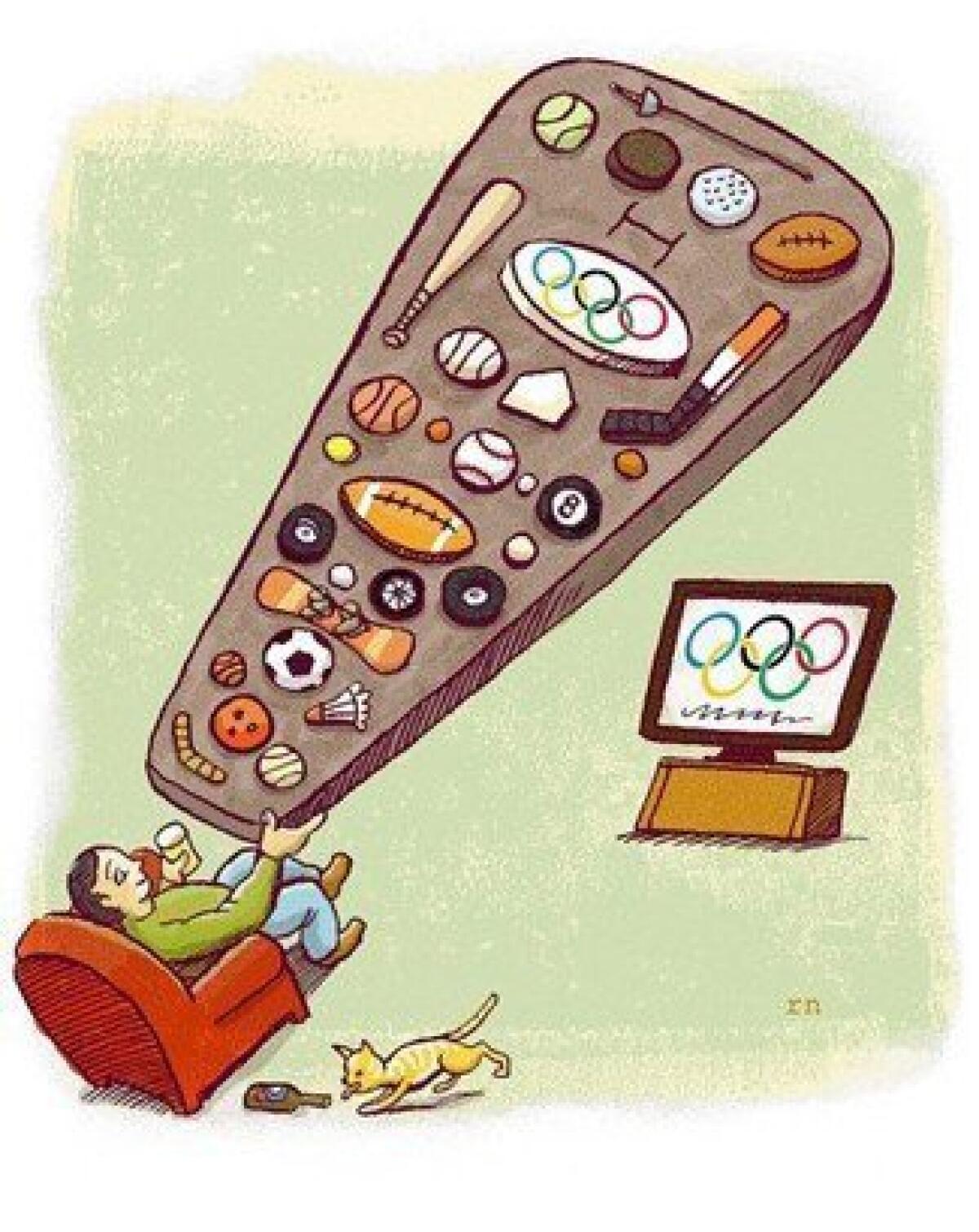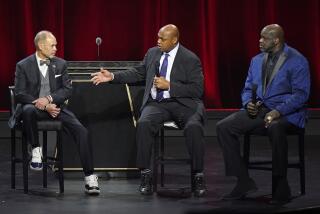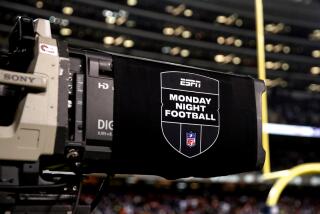Sports programming on a fast track of expansion

On a fall Sunday early last decade, a young reporter living in Berlin wanted to follow a regular-season NFL game being played by his favorite team.
But he had few means to do so. The closest American-themed sports bar was 20 miles away. An online written account would offer only scant details and hardly in real time. Television wasn’t an option; the lone European sports network was four hours into a Formula One marathon.
The reporter hit upon a solution: He called a family member in the U.S. and asked him to turn on a radio play-by-play call. Then he asked the family member to put the phone next to the radio and crank up the volume. Three hours, a $40 phone call and one tinny-voiced broadcast later, the reporter’s sports itch had been scratched. Sort of.
POLL: What are the greatest sports movies?
A fan circa 2012 doesn’t need any Rube Goldberg-esque solutions to get his football fix. He or she lives in what appears to be a sports media utopia — though as a dive into the subject makes clear, it’s also a place filled with pitfalls, aggravations and drawbacks. If there’s an abundance of choice, is this in some ways also a tyranny?
Today’s fan could watch the network television broadcast on TV via his Slingbox, stream the game on his tablet or watch near real-time highlights on his mobile phone, generally for far less than the cost of a pricey international call.
Nor would the game be the only piece of available programming. Hundreds of hours of NFL-related material are at a fan’s fingertips — pregame commentary, postgame interviews, in-game analysis, highlight compilations and fantasy updates, all spread across a host of television networks and Web sites.
“Sports fans have an unbelievable appetite for content,” said David Berson, executive vice president of CBS Sports and president of the recently relaunched spinoff CBS Sports Network, which is trying to gain traction with a new Jim Rome show. “They can’t get enough — before the game, during the game or after the game. The sports world now is a never-ending news cycle.”
To broadcast the London Games, which get underway this week, NBC Universal will make use of a half-dozen networks in its empire. It will also show every minute of the 3,500 hours of competition online, shattering the record total of 2,100 hours from the 2008 Beijing Games. “We want London to be the single-biggest event in sports history,” said NBC’s Jim Bell, executive producer of the Olympics coverage. If somewhere, sometime in middle of the American night, a synchronized swimmer is performing a side fishtail, a camera will be there to capture it.
PHOTOS: Olympic Games TV moments worth remembering | Olympics Now blog
(The network is looking to tap into the average daily audience of 27 million that tuned in for the 2008 Beijing Games — and justify its pricey $1.18-billion purchase of TV rights to the Games, though executives have said they do not necessarily expect ratings for London to top Beijing.)
To say there is more sports programming than ever is to say that Kobe Bryant kind of doesn’t mind shooting the basketball. Sports is omnipresent on television as well as on-demand and online. Each broadcast network now has at least one cable spinoff. ESPN, the first to recognize an appetite for sports beyond broadcast television, has more than a half-dozen, including the recently relaunched ESPN3, a live-event online streaming channel.
Fox is widely thought to be planning a national sports cable channel to go along with its lucrative regional efforts and specialized networks that focus on soccer, auto racing and extreme sports; the idea would be to compete against longtime juggernaut ESPN. Sports coverage in general is expanding to include not only more sports but less traditional television events, from the NFL draft to skateboarding competitions.
All of the major and some not-so-major pro sports also have also launched their own networks, in the hopes a fan wants to catch yet one more game at the end of the day. So in addition to every conceivable piece of footage and analysis about the NFL, NBA, MLB and NHL, enthusiasts can tune in to experience 24-7 the joys of auto racing in Japan or men’s tennis in Dubai — not to mention niche events such as lacrosse, emerging sports such as mixed martial arts and even high school and low-profile college sports.
But the expansion has significant repercussions. That’s true for the media companies, who have paid tens of billions of dollars for the right to broadcast sports — dollars they don’t always get back. “This is not a business for the faint of heart,” said Eric Shanks, co-president and COO of Fox Sports. “There are a lot of zeros at the end of those checks.”
Maybe even more important, it’s true for the fan, for whom the implications are vast but not always positive. Is sports at the leading edge of a 21st-century trend of unlimited data and transparency? Or is it burdened under an avalanche?
Does the push-button availability of any competition anywhere in the world mean we are living in a time of ample riches? Or is it an era of sports overload in which some of the magic and mystery have been stripped away?
‘It’s live and immediate’
In recent years, executives at every television network have faced a stark truth: Fewer people are watching television. And even fewer are watching commercials as they time-shift programs.
Into this void comes sports, the rare form of entertainment resistant to DVRs. (Just remember the last time you recorded a game and tried to avoid finding out the result.) “It’s live and immediate,” said Jon Miller, president of programming for NBC Sports and NBC Sports Network. “You don’t know the ending, and that makes it the ultimate reality programming.”
ESPN President John Skipper suggested an added benefit. “It’s something you can’t knock off,” he said. “No one can knock off the Rose Bowl.’American Idol’ is a good program, but it’s been knocked off ad nauseam.”
(Still, it’s worth noting that many big-ticket sports-rights deals have not been profitable; networks have lost money on everything from NASCAR to baseball to the NFL in recent years. Executives counter that the losses are small compared with the promotional value they bring to a network. Either way, sports-rights fees show no signs of coming down. As Skipper acknowledges, “All it takes is two bidders to create a robust market, and these days there are often three or four.”)
As viewership slid for all sorts of scripted and reality shows, many networks were also interested in growing their business, and sports is a proven way to do that. So NBC took a largely forgotten network, Versus, and relaunched it as the NBC Sports Network. Turner Broadcasting expanded into sports such as college basketball, even putting games on its oft-overlooked Tru TV. “The Dodgers sold for billions of dollars because, using the Dodger games, a company is going to be able to start a new sports channel,” said Neal Pilson, a former head of CBS Sports who now works as a consultant.
These media companies also saw sports as a way to expand their digital business. CBS Sports.com and CBS have created an elaborate, intricate system in which they aim to attract a hard-core football fan and, from dawn to dusk on a fall Sunday, pass him carefully between online content such as fantasy roster information and traditional on-air broadcasts, then back again. “There’s a lot of strategy that goes into figuring out habit points and making sure we’re a part of fan’s routine in every way,” said Jason Kint, senior vice president and general manager of CBS Interactive.
Finally, executives have increasingly understood that sports can be used to target a younger demographic that they fear they’re losing to social media. Fox has been one of the networks attuned to this, buying broadcast rights to mixed martial arts and other youth-oriented sports.
When the video-game company EA Sports came in to the network to talk about branding opportunities, its representatives mentioned that their second-most popular game was FIFA Soccer. That sparked a light bulb in the minds of network executives. “We realized young viewers right now might not recognize Lionel Messi on television,” Fox’s Shanks said. “But they knew how good he was from playing the video game, and they might watch him if he was on TV.”
Soon after, the network bought broadcast rights to the men’s and women’s World Cups.
Should fans rejoice?
But ambition explains only why companies have created all this programming. Do fans have reason to feel excited too?
POLL: What are the greatest sports movies?
On one level, the abundance of sports content is undoubtedly a good thing. “In all my years running CBS Sports, I never once got a note from someone worried there was too much choice,” said Pilson. We’ve come a long way since a time when three networks showed barely a handful of sports hours each week, when major games from the NFL were only on radio and NBA Finals contests aired on tape delay.
If a few of these new programming initiatives take off, one also imagines a flatter, more diverse sports world dominated less by three or four major leagues and instead populated with a range of competition. It will be a place where lacrosse, soccer and mixed martial arts jostle alongside more traditional powerhouses — the kind of eclectic marketplace that historically benefits consumers.
Somewhat problematic, though, is a creeping sense among fans and even some in the industry that all this programming is not always a march toward progress, that it also must feed the intangible, mystical excitement that made us care about strangers tossing a ball around in the first place. (“A thousand channels and nothing’s on,” said Ultimate Fighting Championship President Dana White of his view of the landscape, multiplying Bruce Springsteen’s famous lament.) A lot more coverage doesn’t mean we have more fun, let alone know more about sports or the people who play them.
“We see a lot more behind the scenes, but when I turn on the TV I get a player on a podium and 43 cameras pointed at him,” said Jim Bouton, the former major league pitcher who helped kick off the era of locker-room transparency four decades ago with his bestselling book “Ball Four.” “How much can you really know in that environment?”
Bouton said he also believes the attention has transformed players and the game — and not always for the best. “The oversaturation of coverage has given players an exaggerated sense of their own importance,” he said. “A guy hits a home run in the third inning of a game, and he acts as though it was a religious event. A guy scores a goal in soccer, and he runs across the field like he just liberated France.”
There are also, of course, rampant increases in marketing, particularly of the in-game sort — the old “Simpsons” joke about the announcer name-checking a sponsor while a fly ball is in the air would hardly seem farfetched to anyone who’s watched a nationally televised MLB game recently.
It’s also hard not to wonder if the sheer volume of programming is having a dilutive effect. Adding more plays and games (while the leagues themselves create more games and teams) means any individual game or play is a little less special.
“It’s easy to remember great plays from when we were kids,” said Bryant Gumbel, the veteran sports and news broadcaster. “Now it’s hard to identify anything exceptional because there’s so much of it. You’ll see a great catch and then the next day there’s another one, and then another one. If you’re a kid watching all of it, your memories won’t be very special.”
Nor does more commentary necessarily mean sharper insight. As Will Leitch, the founder of sports-contrarian site Deadspin, said, “There’s a lot of shouting and fluff on the airwaves. I don’t think people are going to look back at this 10 years from now as some kind of golden era.”
PHOTOS: Olympic Games TV moments worth remembering | Olympics Now blog
Sports fans growing up in a previous era may have been frustrated at the lack of information — abbreviated wire-service accounts from an out-of-market game, a player’s personality gleaned from a fun fact on the back of a baseball card — but there was undoubtedly a sense of charm and awe to the whole enterprise. Sports teams and their players were inaccessible — the idea of a locker-room tweet was about as intuitive as a slam-dunk contest on the moon — in many cases adding to their legend and appeal.
And, really, no matter how much one embraces technology, can any mobile-enabled, cross-platform interactivity really compare to, say, Vin Scully calling a Dodgers game on a hot summer night?
It’s not just the sentimental among us who sometimes feel this way.
“My job involves figuring out the best way to deliver digital information on as many screens and platforms as possible,” said CBS Interactive’s Kint, departing refreshingly from the more-is-better school of executive thought. “But when I take my kids to a baseball game I want them to score it with a pencil and a piece of paper. When you’re looking at your mobile device every minute you’re missing out on the sheer joy of that.”
PHOTOS, VIDEO AND MORE:
PHOTOS: Behind the scenes and the Emmys Round Table
PHOTOS: Celebrity photos by the Times
VIDEO: Watch the latest fall TV trailers here
More to Read
The complete guide to home viewing
Get Screen Gab for everything about the TV shows and streaming movies everyone’s talking about.
You may occasionally receive promotional content from the Los Angeles Times.







